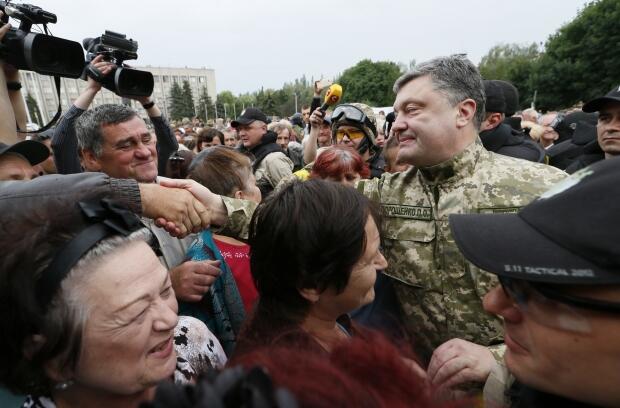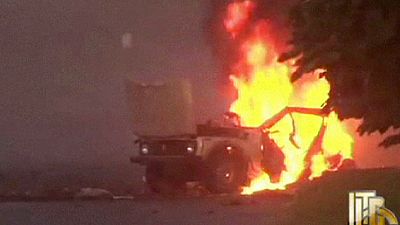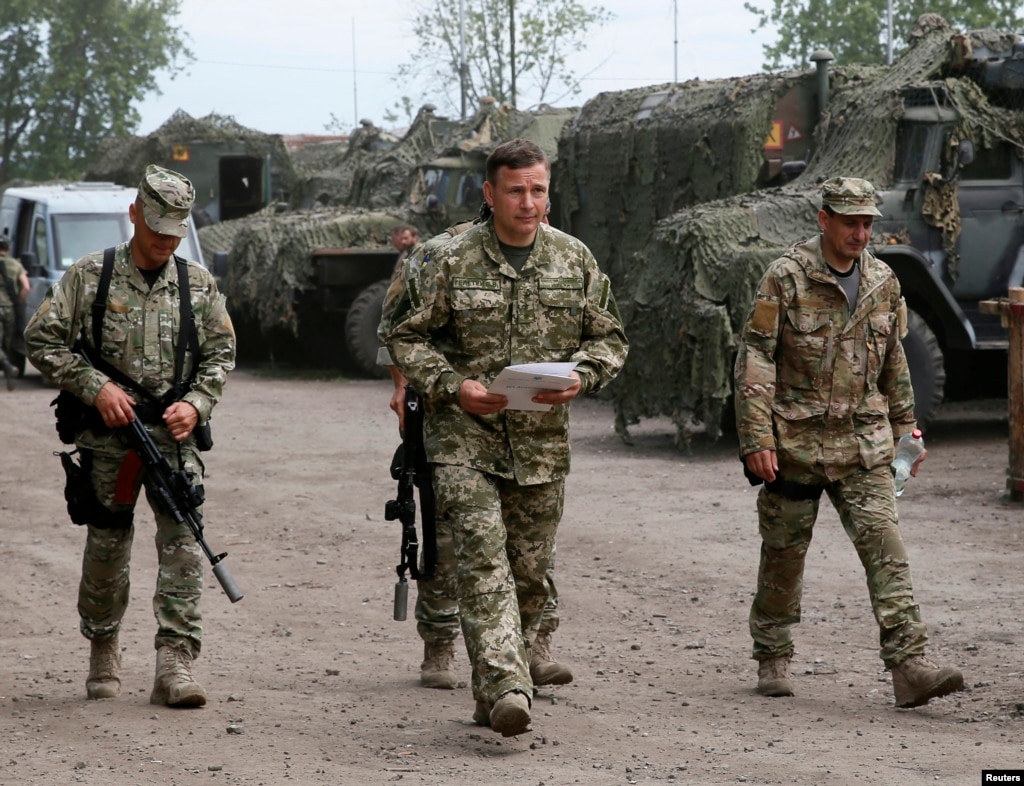Reuters: 08. July 2014
By Richard Balmforth and Maria Tsvetkova
Ukrainian Armed Forces continue to advance and release Donbass towns from pro Russian insurgents.
* New Kiev commander signals intent to drive home offensive
* Rebel leader says regrouping in Donetsk to fight back
* Poroshenko leaves door open for fresh peace talks
* Signs of split in Donetsk rebel ranks (Adds Poroshenko in Slaviansk)
KIEV/DONETSK, Ukraine, July 8 (Reuters) - Ukraine's government kept up military pressure against pro-Russian rebels on Tuesday, threatening them with an "nasty surprise", while the militants said they were preparing to fight back after losing their main stronghold.
President Petro Poroshenko, drawing confidence from the fall of the rebel bastion of Slaviansk at the weekend, named a new chief of military operations in the east following his appointment of an aggressive new defence minister who again demanded the separatists lay down their arms.
A security official said the government's plan to clear rebels from the two big towns of Donetsk and Luhansk would come as an "nasty surprise" for the insurgents.
But Poroshenko - whose officials have ruled out any more unilateral ceasefires - kept the door open to a further round of indirect peace talks with separatist leaders, naming a possible venue in a government-controlled monastery-town in the east.
 Ukraine President Petro Poroshenko made a surprise visit to Sloviansk, July 8th 2014.
Ukraine President Petro Poroshenko made a surprise visit to Sloviansk, July 8th 2014.
 Ukraine President Petro Poroshenko made a surprise visit to Sloviansk, July 8th 2014.
Ukraine President Petro Poroshenko made a surprise visit to Sloviansk, July 8th 2014.
Poroshenko on Tuesday visited Slaviansk, which lies in eastern Ukraine's industrialised Donbass region.
"Until today Slaviansk was a symbol of terror and violence. Today Slaviansk is a symbol of a free Donbass and I thank you for that," he said on the city's main square in front of what was one of the rebels' main headquarters.
Meanwhile, signs emerged of a split in separatist ranks over the fall of Slaviansk with a powerful field commander critically questioning the pull-out from the rebel stronghold.
The rebels' loss of Slaviansk marks a major breakthrough in Kiev's three-month long fight against Russian backed separatists who are now calling in vain for military help from Moscow.

One rebel leader played down its loss as a military expedient and said the hundreds of fighters who were able to move from the town to the regional capital Donetsk were preparing a command structure to defend that city and hit back:
"We're not preparing ourselves for a siege. We are preparing ourselves for action," Alexander Borodai, prime minister of the self-proclaimed Donetsk People's Republic, told a Russian online newspaper during a visit to the Russian capital.

Sporadic shooting was heard from parts of Donetsk overnight. In Luhansk, a city on the border with Russia where rebels also control key buildings, two people in a minibus were killed by a shell that exploded nearby, a municipal official said.
"There is an exchange of fire among the separatists. They are shooting at each other," Iryna Verigina told a Ukrainian television station by telephone from Luhansk.
Poroshenko, installed in office just a month ago, named Vasyl Grytsak to head the "anti-terrorist centre", making him operational chief in the drive to crush the rebels.
The move continued his shake-up of the military and security leadership in which he has appointed a hardline defence minister to bring fresh vigour to the fight against the insurgency.

Grytsak, a 53-year-old police lieutenant-general and 20-year veteran of the state security apparatus, replaces Vasyl Krutov, who had headed the "anti-terrorist centre" since mid-April.
Despite some successes against the rebels, Krutov and other security officials have come under criticism for the patchy performance of the armed forces and big military losses including the downing by the rebels of an Ilyushin Il-76 plane in June with the deaths of more than 49 crew and servicemen.

FOCUS ON DONETSK
Pro-Russian rebels have been fighting government forces since April when they set up separatist republics in the Russian-speaking east after political upheaval in Kiev led to the ousting of a Moscow-backed president followed by Russia's annexation of Crimea.
They have brought down military helicopters and ambushed government forces on the ground in three months of fighting in which more than 200 Ukrainian troops have been killed, along with hundreds of civilians and rebels.
The fall of Slaviansk to government forces at the weekend has now swung the focus onto Donetsk, raising the question of how the Kiev military will go about breaking the resistance in a sprawling industrial city with a population of over 900,000.
Security officials in Kiev gave away nothing about their military plans. But a spokesman for the "anti-terrorist operation", Andriy Lysenko, said: "There is a plan ... under which we will be able to liberate these towns (Donetsk and Luhansk).
"We are not publicising details of this plan. It should be a nasty surprise for the terrorists," he told journalists.
 Situation on the ground on July 8 2014.
Situation on the ground on July 8 2014.
At a meeting on Monday with Poroshenko, Donetsk mayor Olexander Lukyanchenko urged him not use air strikes or heavy artillery to crush the rebels. Ukraine's richest man, coal-and-steel magnate Rinat Akhmetov, made a similar appeal on Monday.
"We have a population in the town now of more than 900,000 people minus those who have left. It's impossible to evacuate them and there is nowhere for them to go. Their security must be guaranteed via negotiations at all levels," said Lukyanchenko, according to his website.
Since hundreds of rebels flooded into the city at the weekend, armed men have been out on the streets, setting up new barricades and checkpoints.
Alexander Borodai Prime Minister of the self-declared Donetsk Peoples Republic speaks to media about the current situation of Ukraine crisis in Donetsk, Ukraine on July 1, 2014.
Borodai brushed off suggestions that Slaviansk had been a defeat, portraying it as a successful tactical withdrawal, though Kiev says the rebels sustained heavy losses.
Borodai, who also scoffed at talk of Kiev having resources to blockade Donetsk and Luhansk, said Igor Strelkov, a Muscovite who commanded forces in Slaviansk, would take over as commander-in-chief for defending Donetsk.
But another rebel commander, Aleksander Khodakovsky of the so-called Vostok battalion - or eastern battalion - whose fighters also occupy positions in Donetsk was critical of the decision to pull out of Slaviansk.
"Frankly speaking, we didn't believe them when we got phone calls saying they were leaving Slaviansk," he told a small group of journalists including Reuters.
"I hope Strelkov did not come here in order to go away," he said. "There will not be one single commander here ... because if Mr Strelkov suddenly chooses to leave Donetsk, with the aim of preserving the lives of the people of Donetsk and the lives of the volunteers, then we will not follow his order," Khodakovsky said.
In the worst crisis between the West and Russia since the Cold War, Moscow has denied accusations of fanning separatism in Ukraine's east and allowing military equipment and fighters to cross into Ukraine to support the separatists.
Though Borodai said he had been in "consultations" in Russia, many rebels now reproach President Vladimir Putin's administration in Moscow, which is under threat from further Western sanctions, for giving them too little help.
The Ukrainian army's victory in Slaviansk has pushed peace talks involving separatist leaders off the agenda.
But Donetsk's mayor, Lukyanchenko, said Poroshenko on Monday had proposed that a further round of talks, involving the so-called "contact group" and the separatists, should be held in the town of Svyatohirsk, north-east of Donetsk, which is the site of a 15th century Orthodox monastery.
Agence France-Presse: 08. July 2014
 Pro Russian patrol near a check-point in the north of the Donetsk region on July 3, 2014
Pro Russian patrol near a check-point in the north of the Donetsk region on July 3, 2014



Pro Russian rebels pulled out a Soviet era T-54 tank from a historical museum in Donetsk, in atempt to use it against Government forces July 7, 2014.
 Ukrainian troops camouflage their multiple rocket launcher at a checkpoint in Kryva Luka, eastern Ukraine, Saturday, July 5, 2014.
Ukrainian troops camouflage their multiple rocket launcher at a checkpoint in Kryva Luka, eastern Ukraine, Saturday, July 5, 2014.

Ukraine on Tuesday brushed off strong European pressure and rejected talks with pro-Russian rebels on a truce to halt a bloody insurgency convulsing the ex-Soviet nation until they lay down their arms.
The unconditional stance reflected a new confidence in Kiev that it was on the verge of quashing an uprising it views as Moscow's retribution for the February ouster of a Kremlin-backed leader and the decision to pursue a historic alliance with the West.
But it was also bound to frustrate EU leaders' push for a diplomatic solution as well as the Kremlin's own efforts to force Kiev to make compromises that would preserve the Russian-speaking east's links to Moscow.
"Now, any negotiations are possible only after the rebels completely lay down their arms," Defence Minister Valeriy Geletey said in a statement.

Ukrainian army arrests suspected of being members or aiding rebels, Slovyansk, July 6th 2014.
Ukrainian forces have scored a string of surprise military successes since the weekend that forced most of the militias to retreat to the sprawling eastern industrial hubs of Donetsk and Lugansk -- both capitals of their own "People's Republics".
President Petro Poroshenko has ordered his troops to blockade the insurgents inside the cities and cut them off from any further arms supplies.
The new Western-backed leader said during an unannounced visit to Slavyansk -- a former rebel bastion reclaimed by Kiev on Saturday -- that talks with the uprising's commanders were impossible because most were now hiding in Moscow.
Poroshenko told reporters that he would only speak "to the real masters of (the easter region of) Donbass -- the steel workers and miners, people who hold the most power" in the conflict zone.
But it was not immediately clear how he intended to force the militias to give up their three-month campaign to join Russian rule.
Lugansk separatist leader Valeriy Bolotov claimed that his men had managed to actually push back Ukrainian troops from part of the Russian border city and receive fresh supplies of anti-aircraft and artillery guns.

Pro Russian rebels pulled out a Soviet era T-54 tank from a historical museum in Donetsk, in atempt to use it against Government forces July 7, 2014.
Poroshenko tore up a 10-day ceasefire on July 1 because of uninterrupted rebel attacks that claimed the lives of more than 20 Ukrainian troops.
Uneasy EU leaders are hoping that a new truce and a Kremlin promise not to meddle can take pressure off the bloc to adopt sweeping sanctions that could damage their own strong energy and financial bonds with Russia.
French President Francois Hollande said he intended to press Poroshenko on Wednesday during a joint call with German Chancellor Angela Merkel.

US defends eastern campaign
But Washington has consistently backed the stepped-up campaign being waged by Ukrainian troops and irregular forces since Poroshenko's promise after his election in May to quickly quash an uprising that has cost nearly 500 lives and inflamed East-West ties.
The United States views Ukraine's territorial integrity as vital to European security and important to halting Russian President Vladimir Putin's seeming ambition to resurrect a tsarist or post-Soviet empire.
US State Department spokeswoman Jen Psaki reiterated on Monday that "the government of Ukraine is defending the country of Ukraine, and I think they have every right to do that."
Poroshenko on Tuesday dismissed the man who had headed Kiev's self-proclaimed "anti-terrorist operation" since its launch on April 13 and replaced him with Vasyl Grytsak -- a career security service officer.
The reshuffle was one of several in the Ukrainian Security Service (SBU) and appeared to represent an attempt by Poroshenko to place trusted associates in top positions rather than any change in tactic in the campaign.
'Tough choice' for Putin
Germany's Berenberg Bank economist Holger Schmieding said Putin now faced a tough choice between dealing a blow to Russia's economy by further boosting support for the rebels or seeing his own popularity suffer by taking no action at all.
"He may either have to step up his support for the pro-Russian insurgents who are now on the defensive; or he may be seen as letting Ukraine advance on the ground in Donbass," Schmieding wrote in reference to the eastern Lugansk and Donetsk regions.
"The former could trigger more serious sanctions and further capital flight from Russia. The latter could hurt his popularity and his 'strongman' image in Russia where (he) had whipped up nationalist sentiment in the last five months."

No comments:
Post a Comment